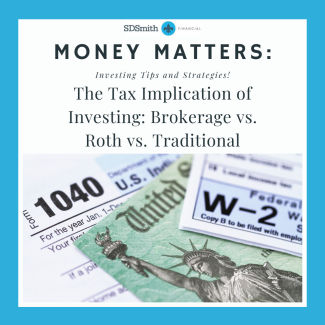
The Tax Implications of Investing
When it comes to investing, the rate of return often steals the spotlight. Everyone wants to know: "How much am I making?" or "How much am I losing?" These are important questions, but there’s more to the story. For instance, even though the S&P 500 averages about 10% annually, not all of that 10% ends up in your pocket. Why? Taxes.
Let's dive into how three main types of accounts are taxed when you invest $100,000 for 10 years at a 10% annual interest rate.
Brokerage Account
Also known as an Individual or Joint account, this is a non-qualified account, meaning it doesn’t have the tax advantages of accounts like Traditional or Roth IRAs. For our example, we’ll focus on long-term capital gains tax.
- Investment: $100,000
- After 10 years at 10% interest: $259,374.25
- Gains: $159,374.25
- Long-term capital gains tax rate: 15%
- Taxes paid: $23,902.09
- Adjusted annual return: 8.94%
Roth Account
Roth accounts are highly favorable for tax treatment, but there’s a common misconception: "I can’t contribute to a Roth; I make too much money." This might be true for a Roth IRA, but not for a Roth 401(k), which has no income limits on contributions.
- Investment: $100,000
- After 10 years at 10% interest: $259,374.25
- Taxes on gains: None (if withdrawals are qualified)
- Adjusted annual return: 10%
Traditional Account
Traditional accounts have a more complex tax treatment. The entire amount is subject to ordinary income tax rates upon withdrawal.
- Investment: $100,000
- After 10 years at 10% interest: $259,374.25
- Taxes on total amount (at minimum rate for married couples with no other taxable income): $48,334.58
- Adjusted annual return: 7.75%
Traditional accounts also have Required Minimum Distributions (RMDs) starting at age 73 (changing to 75 in 2033). RMDs can impact your net worth later in retirement.
The Role of Financial Advisors
As a financial advisor, I believe our true value lies in helping clients navigate these tax implications and choose the right account types. While you might find similar investment returns online, ensuring you keep the maximum amount of your return is where professional advice makes a difference.
For more detailed information on tax implications and strategies, check out the following resources:
By understanding these tax implications, you can make more informed decisions and optimize your investment returns.
For a comprehensive review of your personal situation, always consult with a tax or legal advisor. Neither Cetera Advisors LLC nor any of its representatives may give legal or tax advice.

